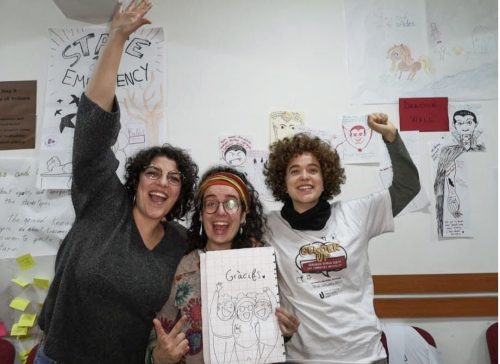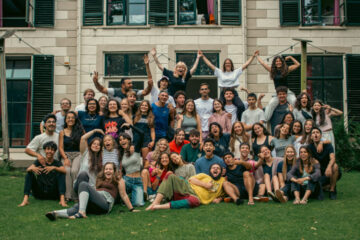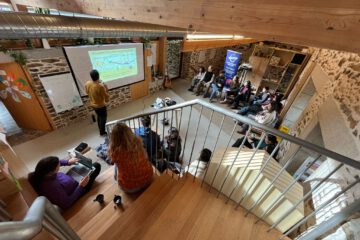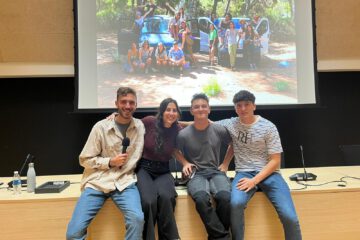El Training Course «Gender Up», a cargo de la organización UIET, tuvo lugar en Transilvania (Odorheiu Secuiesc), del 9 al 19 de enero del 2020.
Los objetivos de este T.C. eran abordar, con diversas dinámicas grupales, la problemática de la igualdad de género; entender la comunicación a través del cómic y su estructura y elementos más simples; y realizar, por grupos, cómics y fanzines en torno a la temática central del curso.
La experiencia fue muy enriquecedora a nivel personal, puesto que el intercambio cultural y de opiniones que se dio resultó interesante, en tanto que el grupo se componía de personas de países tan distintos y alejados como Moldavia, Ucrania, Azerbayán, Armenia, Grecia, Turquía, Reino Unido, Rumanía y España. Asimismo, pudimos conocer mejor la realidad del territorio de Transilvania y mantener conversaciones en torno a fenómenos complejos como la identidad, la organización política y el estado de nuestros distintos países de origen. Además, hicimos bastantes visitas de campo, que si bien se alejaban de la temática central del curso, nos permitieron ver más de cerca la realidad de la población que nos hospedó. En definitiva, si bien pudo haber sido una experiencia que ahondara más en el género y las dinámicas de des/igualdad, en general podemos decir que fue una experiencia positiva, que nos ayudó a entender mejor el mundo en el que vivimos y a nosotras mismas.

Mar, Anna y Noa
Para entender cómo habían vivido el resto de participantes su experiencia realizamos un reportaje a través de breves entrevistas acerca de cómo había cambiado su forma de entender la igualdad de género a través del proyecto, qué significaba para ellas y cómo había sido su experiencia en el curso de formación. Aquí os dejamos algunas de sus reflexiones:
« For me, gender equality is respect for all people regardless of nationality, colour or place of residence. And the same right for men and women in work, in healthcare, in the social sphere, in the family, in polities, in education and in religion. »
Nina [Moldavia]
« I love the things I learn about the different countries and cultures, and what is the situation there for gender equality. I learned about gender and sexuality issues that I didn’t know about. »
Lina [Grecia]
« For me, the project about gender’s equality opened new learnings about how different countries and different cultures understand this topic. The point we achieved is that till the end of the project, both men and women, agreed that for daily activity for both gender is the same and there should be equity »
Daniela [Moldavia]
« For me, that I live in Greece, this program was very useful because we learnt about gender equality for countries such as Azerbaijan and Armenia that is totally different from Europe and Greece. We also show up gender issues but not in such way like Armania, Azerbaijan and Turkey less »
Dora [Grecia]
« My main learning’s about gender equality actually in this project was more about the shocking disrespect that nowadays in some East countries show to the women (I mean in a big scale). Also I was and I still am really questioned regarding to the matter who and under what circumstances define the roles that women should engage on contrary to men roles. »
Elpida [Grecia]
« It’s so important for me to inform the problems and advantages about gender equality all of the world. During the conference we share most important information each other and I improve my knowledge about this theme. I will exactly share all news with people surrounding me.
The main learning in gender, form the smallest to the most extreme situations, one should work to maintain the equality, rather than find the justification that it is because a person feels in an unequal position. »
Niko [Armenia]
« As for the question, what was my knowledge about gender equality before our Erasmus project, I can say that I teach a similar topic in the discipline of sociology, and it is called the sociology of family and marriage. In general, I think this is a very interesting topic about feminism, but since I am interested in religion, I am particularly interested in such aspects of the topic as: science and gender, religion and theology of women, religion in the gender dimension and feminist hermeneutics, gender approach to religious studies and female religiosity, feminist theology and gender studies, theology of feminism and the ministry of women in the church, female priesthood and woman’s rights. »
Olga [Ucraina]


